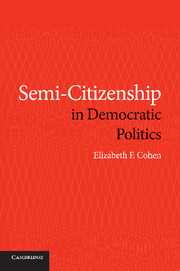Book contents
4 - Logics of Semi-Citizenship
Published online by Cambridge University Press: 02 February 2010
Summary
He is a citizen in the fullest sense who shares in the honors of the state.
INTRODUCTION
Semi-citizenship refers to different combinations and degrees of citizen-ship rights. Chapter 3 argued that a normative framework for identifying semi-citizenships would not identify semi-citizenships as they exist in politics. This leaves open the question of what actually produces semi-citizenship. While Chapter 3 rejected relying upon the justifications (both normative and non-normative) for citizenships as a means of categorizing semi-citizenships, it left open the possibility that such justifications play an important role in the creation of semi-citizenships. Normative theories, particularly democratic theories with their attendant reference to specific ethical traditions, and theories of universal liberal right, justify different boundaries around citizenries. Administrative rationality, particularly that imposed by the state, also justifies the setting of boundaries around a citizenry. Liberal democratic states draw upon all these justifications when making rules about who can be included and in what ways. The boundaries of citizenship are determined simultaneously by democratic and liberal norms as well as administrative rationality. This means that to understand the existence of semi-citizenships, we need to understand not what it is that any particular doctrine of membership dictates, but instead what happens to citizenship at the intersection of different doctrines or logics of membership. As prefigured in Chapter 1, semi-citizenships are not created at the margins of politics so much as they are formed at the seams that knit together the diverse fabric making up liberal democratic states.
- Type
- Chapter
- Information
- Semi-Citizenship in Democratic Politics , pp. 95 - 140Publisher: Cambridge University PressPrint publication year: 2009

